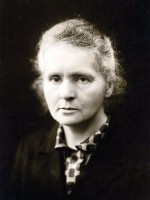November 7: The unofficial day of women in nuclear science?

Marie Curie was born in Warsaw in 1867 on this day, 155 years ago. Exactly 11 years later, in 1878, Lise Meitner was born in Vienna. November 7 is also the date when, in 1911, the Swedish Royal Academy of Science decided to award Curie a second Nobel Prize for her 1898 discovery of the elements radium and polonium (coincidentally, her 44th birthday). Curie, who at age 36 had shared the 1903 Nobel Prize in Physics with her husband, Pierre Curie, and Henri Becquerel, later accepted the chemistry prize on December 10, 1911. She remains to this day the only person—man or woman—to receive two Nobel Prizes in two different fields of science. (Linus Pauling was also awarded Nobel Prizes in two categories: chemistry and peace.) On this unofficial day of women in nuclear science, let’s take a moment to acknowledge the fundamental discoveries of both Curie and Meitner.



 The International Atomic Energy Agency has awarded
The International Atomic Energy Agency has awarded  Marie Curie has been quoted as saying, “Nothing in life is to be feared, it is only to be understood.” We can only wish that the creators of Radioactive, a feature-length biopic released on
Marie Curie has been quoted as saying, “Nothing in life is to be feared, it is only to be understood.” We can only wish that the creators of Radioactive, a feature-length biopic released on  The start of Marie Curie's story isn't like most of the other scientists that had made a name for themselves throughout history, mostly because she was a grown woman by the start of the 20th century. But she was the first woman to do a lot of things, including getting a Ph.D. from a university in France, and winning a Nobel Prize. She was also the first person ever to win a Nobel Prize in two different fields of science. To say she pushed the societal and scientific boundaries of her era is an understatement.
The start of Marie Curie's story isn't like most of the other scientists that had made a name for themselves throughout history, mostly because she was a grown woman by the start of the 20th century. But she was the first woman to do a lot of things, including getting a Ph.D. from a university in France, and winning a Nobel Prize. She was also the first person ever to win a Nobel Prize in two different fields of science. To say she pushed the societal and scientific boundaries of her era is an understatement.